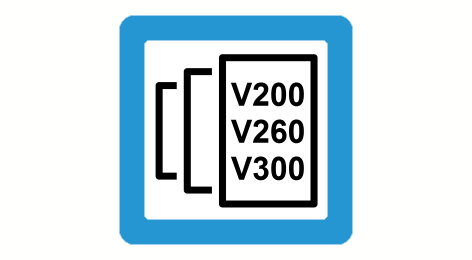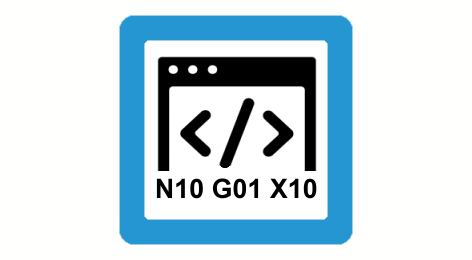KIN_TYP_213- Five-axis palletising robot
The articulated axes are 1,2,3,4,5. Axis 1 rotates about the z axis of the Cartesian coordinate system. The robot is represented in Figure 2 with all articulated axes in zero position.
Release Note

Functionality available as of CNC Build V3.1.3081 or V3.1.3108.
Rotation in positive direction corresponds to the mathematically positive direction of rotation in the Cartesian coordinate system. Articulated axes G2, G3, G4 must be configured as linear axes (with a limited range of motion).
Articulated axis G5 must be configured as a modulo axis within the range of -180° to +180°. Optionally, articulated axis G1 can be configured as a linear or a modulo axis, provided no limitations need to be considered, e.g. trailing cables.
Notice

When programming in Cartesian coordinates, the flange must first be aligned parallel to the X/Y plane of the base coordinate system (B=0). Only then will programming the C angle result in the expected alignment of the flange/tool.
However, if the robot is operated with B ≠ 0, the resulting motion may not correspond to the expected orientation.
Notice

In this kinematic model, the programmed tool orientation normally relates to the Cartesian base coordinate system of the machine.
If coordinate systems (#CS) are used, it may be necessary to configure channel parameter P-CHAN-00247 accordingly, depending on the required response.
Axis configuration in the NC channel | ||
Axis identifier | X, Y, Z, B, C (G1, G2, G3, G4, G5) | |
Axis index | 0, 1, 2, 3, 4 | |
Kinematic structure | ||
| Tool axes | Workpiece axes |
NC axes | X, Y, Z, B, C | - |



Offset data of kinematics
HD offset | param[i] | Description | Unit |
HD1 | 0 | Tool Z offset in flange coordinate system | 1.0 E-4 mm |
HD2 | 1 | Tool X offset in flange coordinate system | 1.0 E-4 mm |
HD3 | 2 | Tool Y offset in flange coordinate system | 1.0 E-4 mm |
HD6 | 5 | Angle of tool rotation about the Z axis | 1.0 E-4° |
HD7 | 6 | Z offset base to G2 | 1.0 E-4 mm |
HD8 | 7 | Offset G2 to G3 | 1.0 E-4 mm |
HD9 | 8 | X offset G3 to G4 | 1.0 E-4 mm |
HD10 | 9 | X offset G4 to G5 | 1.0 E-4 mm |
HD11 | 10 | X offset base to G2 | 1.0 E-4 mm |
HD12 | 11 | Z offset G4 to G3 Note: Positive sign; the rotary axis of joint 3 is located in the positive Z direction above the rotary axis of joint 4. | 1.0 E-4 mm |
HD14 | 13 | Rotary offset for zero position of robot joint axis 2 | 1.0 E-4° |
HD15 | 14 | Rotary offset for zero position of robot joint axis 3 | 1.0 E-4° |
HD21 | 20 | Rotation direction of joint axis 1: 0 (positive), 1 (negative) | [ - ] |
HD22 | 21 | Rotation direction of joint axis 2: 0 (positive), 1 (negative) | [ - ] |
HD23 | 22 | Rotation direction of joint axis 3: 0 (positive), 1 (negative) | [ - ] |
HD24 | 23 | Rotation direction of joint axis 4: 0 (positive), 1 (negative) | [ - ] |
HD25 | 24 | Rotation direction of joint axis 5: 0 (positive), 1 (negative) | [ - ] |
HD36 | 35 | Rotary offset for zero position of robot joint axis 1 | 1.0 E-4° |
HD37 | 36 | Rotary offset for zero position of robot joint axis 4 | 1.0 E-4° |
HD38 | 37 | Rotary offset for zero position of robot joint axis 5 | 1.0 E-4° |
HD48 | 47 | Z offset G4 to G5. Note: Positive sign: Flange is in positive Z direction below G4 | 1.0 E-4 mm |
Programing Example

Five-axis palletising robot
N010 #KIN ID[213]
; move robot to arbitrary position
N020 A1=23 A2=[-90] A3=90 A4=[-11] A5=47
N030 #TRAFO ON
; first move flange parallel to "floor"
N040 G00 B0
; then i.e. do some pick and place
; -> flange stays parallel to "floor" if B does NOT get explicitly programmed
N050 F2000
N060 G01 X1000 Y1300 Z700 C0
N070 G01 Z500
N080 G01 X1500 Y1300 Z700 C90
N090 #TRAFO OFF
N100 M30